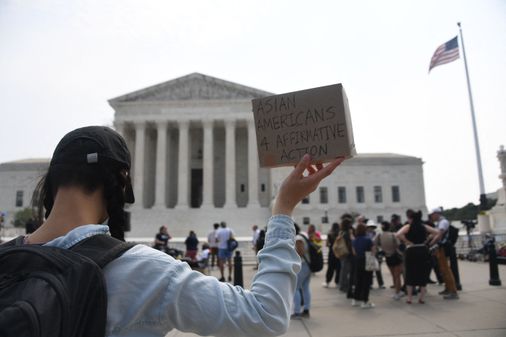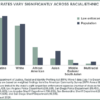
Supreme Court fails to consider how racism is still hard-wired into our society
In ruling that the affirmative action policies of colleges and universities are unconstitutional, the Supreme Court focused on the single issue of race as a factor for admissions. The court failed to contextualize the profound impact on our society of explicitly unconstitutional racist laws and policies of the past (slavery, Jim Crow, exclusion of minority groups from admissions to universities, among others), which continue to tilt the scales of justice against Black, Hispanic, and Indigenous people.
Racism has been documented to play out in myriad ways, which are every bit as abhorrent as the policies that spawned it. These impacts include limited access to high-quality educational opportunities, medical inequities, housing inequalities, adverse employment decisions, criminal justice inequalities, limits to voting access, transportation limitations, lower thresholds of “stand your ground” brutality, and intimidation by white supremacy groups.
The racism that appears to be hard-wired into our society also can be profoundly insidious. My commentary in the peer-reviewed Journal of Pediatrics, “A Consideration of Racism in Pediatric Epidemiologic Studies,” identifies implicit racism broadly evident in medical research.
It would be far better to be explicit in acknowledging the broader goal in balancing justice rather that to claim that a single consideration that relates to university admissions is unconstitutional. Our society needs to find ways to explicitly level the playing field for groups that have been unconstitutionally disadvantaged for hundreds of years. The irony of the Supreme Court’s decision that excludes consideration of race as a factor for admission to universities is that one of the clearest paths to rebalancing the scales of justice is through the opportunity that advanced higher education provides.
Dr. Karl Kuban
Plymouth
The writer is a professor emeritus of pediatrics and neurology at the Boston University Chobanian and Avedisian School of Medicine.
For your further reading, justices
If they haven’t already, the six justices of the Supreme Court who voted with the majority should be required to read Ira Katznelson’s book “When Affirmative Action Was White” or Richard Rothstein’s “The Color of Law.”
The US government, in all its iterations, has been creating laws and policies that advantage white people for generations. I am a white woman who continues to be shocked by what I have learned in just the past few years about how our government has consciously disadvantaged Black people in this way.
Sandy Thompson
Winchester
We’ve been forcing a square peg of guilt into a quasi-constitutional round hole
Race-based affirmative action has been legal for decades and was always unconstitutional. It became a staple of our society by forcing a square peg of guilt for anti-Black racism into a quasi-constitutional round hole, albeit with an understanding that in time this accommodation would be rescinded. The time has come, and the Supreme Court has made the correct constitutional judgment.
Dissenting opinions imply that structural racism reigns over our society and that the unconstitutional stipulation of race-based action must be retained. But if the minority opinions are to be believed, then this form of unconstitutionality will never cease because structural racism, being structural, will never end. The dissenters’ reasoning suggests that people of color should be permanent wards of the country with respect to college admissions and our Constitution no longer a foundational document.
Paul Bloustein
Cincinnati
The court is right: Affirmative action is racist
Only the best and the brightest deserve to be scholastically rewarded. Getting a free walk due to the color of your skin is simply racist. Bravo to the Supreme Court’s common-sense ruling.
JoAnn Lee Frank
Clearwater, Fla.
With artificial intelligence in the mix, admission season will be a doozy
So much for reality, and welcome to admissions season 2023-2024.
Combine the Supreme Court’s willful destruction of affirmative action with the first admission season ever with the possibility, if not inevitability, of AI-generated application essays and letters of recommendation, and try to pretend that the United States is a race-neutral country, and voila: a perfect recipe for anything but merit-based admission.
The most likely scenario? The further entrenchment — and deflection of attention from — the racialized privileges structurally passed from one generation to the next.
Shame on the court.
Nancy Krieger
Jamaica Plain
Looking back to 1949 and a welcoming party at Yale
When I entered Yale in the fall of 1949, the university had a welcoming party. I recall that I saw classmates who were Black and others apparently from outside the United States. I don’t recall anyone giving any thought as to “why” they were there.
Reading about the Supreme Court decision reminds me that for years I have read about “downtrodden” Black people and immigrants, even as expressed by fellow members of those groups.
When all is said and done, it is not whether one did or did not go to college but rather what we feel we have done with our lives and how we did it.
William H. Wheeler
Duxbury
Two of the justices were themselves beneficiaries of legacy of enslavement
Thursday’s Supreme Court decision barring affirmative action in college admissions came as no surprise. The irony in this court’s decision is that two of the justices voting to overturn more than 50 years of precedent are themselves beneficiaries of generational wealth from slavery. Justices Neil Gorsuch and Amy Coney Barrett have direct ancestors who were slaveholders, according to a Reuters report.
Familial wealth that can be traced to slavery is a clear example of white affirmative action. While making fortunes from the unpaid work of enslaved people, these ancestors created wealth that benefited their families and their descendants. At the same time, African Americans were barred from owning land, working for pay, and attending good schools. Keeping Black people out of the job market, universities, and productive farmland provided increased opportunities for white people.
Gorsuch and Coney Barrett should have had the decency to recuse themselves from this decision. Meanwhile, their descendants can be expected to continue to benefit from a system that advantages some while disadvantaging others.
Irwin Nesoff
Hull
Vote as if the makeup of the Supreme Court depends on it
Elections have consequences. I think some people may have forgotten this lesson and some may only just be learning it now. Perhaps it was inevitable that some felt that no matter who was elected, nothing much would happen. Many have chosen to elect people who would just amplify their frustration with no thoughts about policies to move the country forward.
Via an unfortunate death followed by a Senate maneuver to block the nomination of a Supreme Court justice nomination, a retirement, and another unfortunate death, the previous administration appointed three justices to the Supreme Court. Recent decisions appear to indicate a court determined to undo all progress made on rights for women, LGBTQ people, and people of color.
Elections do matter. They do have consequences. Your vote is the most important right that you have. Use it wisely.
Lou Bernazzani
Danvers


